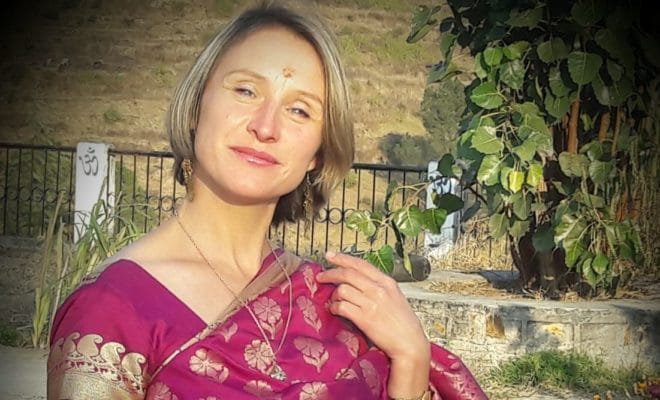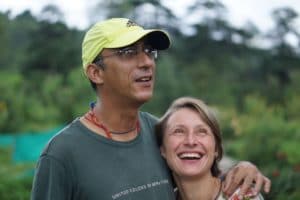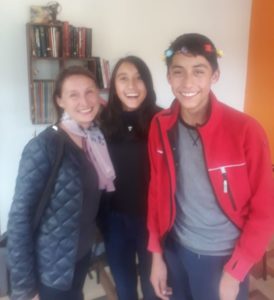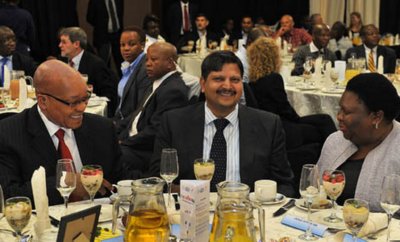Expats
Expat Voice: High on Himalayas

Julia Zolotareva
From the pristine waters of the Baltic Sea in Latvia to the hillsides of Uttarakhand, Julia Zolotareva traveled a long distance and was moved by what she experienced.
When Julia Zolotareva from Latvia visited Uttarakhand for the first time in 2000 with a group of friends, little did she know that her life was going to change forever.
“When I visited Kumaon, I fell in love with the place and my future husband,” Julia, who hails from Riga, tells Little India. “We soon got married, and have two children.”
Julia talks about her first trip to India, her love for yoga and Ayurveda, and running a homestay in the Himalayas:
Love of Yoga and the Himalayas
I joined yoga classes when I was 18 years old. I also learnt the basics of Ayurveda, Vaastu Shastra, Indian mythology, and astrology. In the Soviet era, both India and Russia had close relations so we studied quite a bit of Indian texts. I studied Russian translations of Krishan Chandra’s books and also read a lot about meditation.
When someone offered to take us to India and show us the Himalayas, we were elated. We were also told that we would be living with a local family. I visited Uttarakhand with my friends, all of whom, like me, were yoga practitioners. It was quite strange that I felt very much at home despite being so far away from Latvia.
There is another interesting back story to this. The local family we were staying with knew a guruji, who was said to be over 100 years old. Two couples in our group wanted to seek his blessings. They decided to get married in India in a traditional ceremony. So we went to his ashram in Jageshwar and asked guruji whether couples could get married there. He agreed.
Eventually, not two but four couples got married at the ashram according to Indian rituals. So it was pretty much like attending a marriage party. The horoscopes were matched and the necessary puja was done. Kanyadaan was also performed. The entire ceremony was organized by the local family we were staying with. It was the family of my future husband. That is how I met him.

Julia Zolotareva with her husband Lat Chand Singh.
I went back to Latvia but we kept in touch. He also came over to Riga to meet my family. Five months later, in April 2001, we got married.
Shocking Realities
When I came here, it was quite a shock to see that boys are preferred to girls in Indian families and that female foeticide is still prevalent. The frequent rapes that have been happening over the last few years is a real shock.
However, I feel it is safer living in a village in the hills. People know each other in the rural areas so I can go around anywhere. There has been no curiosity or problem from the local community here.
My daughter studies in a co-educational institution and there’s a lot of pressure to not interact with the opposite gender, which is funny. How are you supposed to build successful relationships with no experience at all?
Preserving Indian Heritage
Indian heritage is not taken care of properly. There are so many beautiful monuments in the country but they are not well-maintained.
However, I am happy with the kind of work the Archaeological Survey of India (ASI) is doing with the temples in Uttarakhand.
Temples in ‘Vridh’ (Old) Jageshwar have been completely restored using proper stones and masonry. They are not cemented or clustered or tiled. The Katarmal Surya Temple suffered damages due to earthquakes and passage of time. It has been beautifully restored too.
I have also seen a change in the mindset of people here, especially the younger generation. They seem to have traveled well, not abroad, but a lot in India. They seem to now realize that it is important to preserve the beauty of India.

A Bit of Yeats at Hawalbagh
We run a homestay in the Hawalbagh village of Kumaon. It was already set up when I moved here. My mother-in-law chose to name it Innisfree after a poem called The Lake Isle of Innisfree written by WB Yeats. The poem talks about how a person runs away from the hectic city life to be in the midst of nature and live a peaceful life.
We also organize trekking and hiking tours. Kumaon does not have a lot of visibility among foreign tourists. It is quiet, untouched and less touristy. I feel privileged to have lived in the presence of the Himalayas for so many years.
Employing Locals
We employ local people, in an effort to create conditions so that they do not have to migrate to the cities to look for jobs.
We also try to make them appreciate their traditional ways of living. Local pahari houses, for instance, are being broken down for cemented structures, which don’t suit the weather here because cement gets hot in the summer and cold during the winter.

Julia Zolotareva with her children Amira (center) and Harsh.
Life in the Hills
Living in the hills had a huge impact on me.
Having had the opportunity to be in the midst of nature, I realized who I am and what I want in life. I am the master of my own time here. I am not saying it’s easy. It is definitely not for everyone. A city dweller may feel too peaceful but staying in the hills proved to be rewarding for me.
Meeting Swami Prakashananda guruji was like witnessing a miracle alive. He touched several lives with his wisdom.
Nagging Problems
The biggest problem here is garbage disposal. The hills are getting dirtier with each passing day.
Even though there’s a rule in the hills to not use plastic bags at all, there is plastic everywhere, because of packaging of things. The collected garbage is dumped in some corner and set on fire. The government needs to make this top priority.
Then there is the issue of power outages. The government can set up units that use garbage to produce electricity. There is some initiative from the local people and NGOs but government support is needed, otherwise all streams and rivers are getting polluted.
A Humbling Experience
You cannot imagine India. You can only experience it. I have never regretted moving to the country.
Staying in India makes you humble. It makes you a better person, and teaches compassion and patience. It teaches you to be thankful for what you have.
The interview has been condensed and edited.
Expat Voice is regular column on expats in India. Email us at expat@littleindia.com to nominate yourself or another expat for the column.



2 Comments